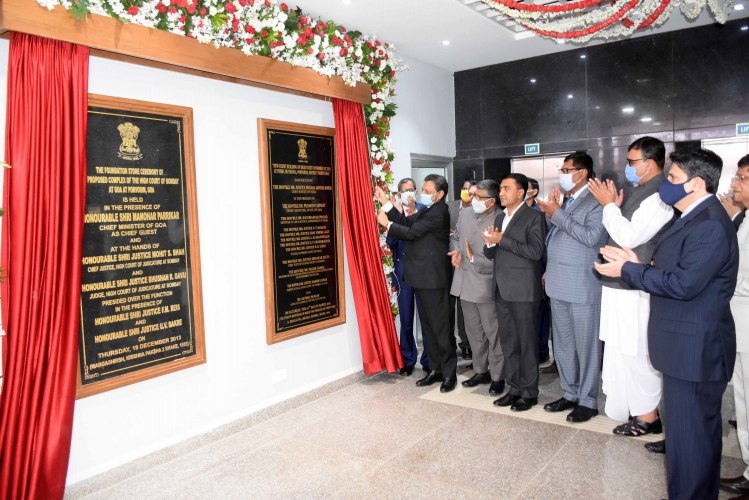
CJI S A Bobde unveils the plaque to mark the inauguration of the new building of Goa bench of the Bombay HC at Porvorim on Saturday. Minister for Law and Justice Ravi Shankar Prasad, Chief Minister Pramod Sawant were also present. Narayan Pissurlenkar
PANAJI
The Uniform Civil Code in operation in Goa, a legacy of the erstwhile Portuguese colonial rule, came in for appreciation by the Chief Justice of India S A Bobde who on Saturday inaugurated the new building premises for the Bombay High Court at Goa in Porvorim.
The Chief Justice, in his speech at the inaugural ceremony urged academics to watch how the Uniform Civil Code governs all Goans on issues of marriage and succession, irrespective of their religion and acknowledged it was the legacy of the Portuguese.
"The legacy of the administration of Justice at Goa, which spans four and a half centuries, must be acknowledged," Justice Bobde said.
Union Law Minister Ravi Shankar Prasad, Chief Minister Pramod Sawant, Justices NV Ramana , BR Gavai, AM Khanvilkar, Bombay HC Chief Justice Dipankar Datta, AA Sayyed and SS Shinde besides Goa's Law Minister Nilesh Cabral were among the dignitaries who were in attendance at the inaugural ceremony.
"Goa has what the Constitution framers envisaged for India – a Uniform Civil Code. And I have had the great privilege of administering justice under that code. I have heard a lot of academic talk about the Uniform Civil Code. I would request all those intellectuals to come here and watch the justice system to know what it turns out to be," Justice Bobde, who served several years at the Goa Bench of the Bombay High Court said.
In a lighter vein, he said he would often hear remarks like, 'Justice Bobde is a Goa Judge.'
The CJI also touched on how the Covid-19 pandemic posed a lot of questions on access to justice but said it helped in modernising the courtroom.
"Though building more courtrooms are necessary and important, there was very little emphasis on modernising existing courtrooms…I see a trend of having smaller courtrooms in the future because of Ravi Shankar Prasad's ministry. The e-filing and the data which can be contained, is going to take away the need for many storage rooms."
Justice Bobde also spoke of the rule of law in medieval Goa thus: "The most significant Kingdom to conquer and rule Goa were the Kadambas. From the 10th to 14th century and administered Justice on a basis of ancient Hindu texts. The judicial system was headed by a CJ known as a Dharma Adhyaksh."
Justice NV Ramana, addressed as the upholder of civil liberties, stressed on the importance of infrastructure for access to justice, especially in district courts.
"After independence, the judiciary has not progressed at an equal pace as compared to other branches of the State... the judiciary is considered rigid due to its procedural requirement. Integrating science and technology in the Judiciary has been an uphill task," Justice Ramana said.
"We have all witnessed courts operating from, old dilapidated structures and rented premises, without proper record rooms or even staff. There are premises without waiting-rooms and washrooms, creche services. Situations like these have an adverse impact on the qualitative dispensation of justice." Justice Ramana added.
Prasad in his address said during the Covid lockdown 82 lakh cases were heard through VC -- 59,309 by the Supreme Court, 27,58,560 by the High Courts and 54,46,876 by subordinate courts.
Prasad added that the Bombay High Court which includes the Goa bench heard over 64000 cases.
He spoke about the landmark judgements that have come from Goa in the field of environment, conservation and sustainable development.
Prasad also said that if judiciary has to work and discharge its duties, it must be left completely free to decide the cases as per the rule of law, the Constitution and their conscience.